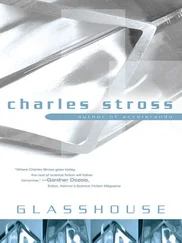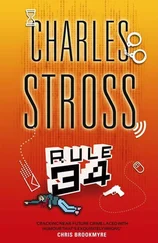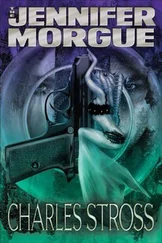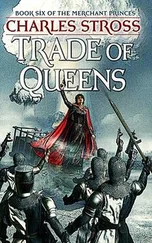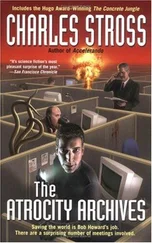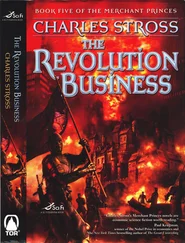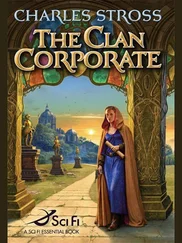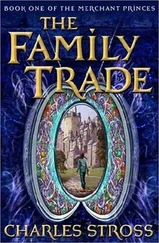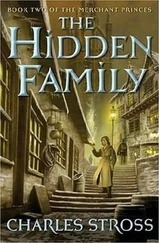Charles Stross - The Merchant’s War
Здесь есть возможность читать онлайн «Charles Stross - The Merchant’s War» весь текст электронной книги совершенно бесплатно (целиком полную версию без сокращений). В некоторых случаях можно слушать аудио, скачать через торрент в формате fb2 и присутствует краткое содержание. Жанр: sf_writing, на русском языке. Описание произведения, (предисловие) а так же отзывы посетителей доступны на портале библиотеки ЛибКат.
- Название:The Merchant’s War
- Автор:
- Жанр:
- Год:неизвестен
- ISBN:нет данных
- Рейтинг книги:5 / 5. Голосов: 1
-
Избранное:Добавить в избранное
- Отзывы:
-
Ваша оценка:
- 100
- 1
- 2
- 3
- 4
- 5
The Merchant’s War: краткое содержание, описание и аннотация
Предлагаем к чтению аннотацию, описание, краткое содержание или предисловие (зависит от того, что написал сам автор книги «The Merchant’s War»). Если вы не нашли необходимую информацию о книге — напишите в комментариях, мы постараемся отыскать её.
The Merchant’s War — читать онлайн бесплатно полную книгу (весь текст) целиком
Ниже представлен текст книги, разбитый по страницам. Система сохранения места последней прочитанной страницы, позволяет с удобством читать онлайн бесплатно книгу «The Merchant’s War», без необходимости каждый раз заново искать на чём Вы остановились. Поставьте закладку, и сможете в любой момент перейти на страницу, на которой закончили чтение.
Интервал:
Закладка:
Bumptious enthusiast, no social skills. Eric decided. He forced himself to nod, draw the guy out. "So you're saying this isn't a large scale cosmological phenomenon-then what is it?" Some of this stuff sounded half-familiar from his physics minor, but the rest was just weird.
"We're trying to work out what it is by a process of elimination." Hu thrust his hands in his pockets, looking distant. "The thing is, we have no theoretical framework. We've got a lot of beautiful theories but they don't account for what we're seeing: we're looking at an amazingly complex artifact and we don't understand how it works. It's like handing a nuclear reactor to a steam engineer in the nineteenth century. If you don't understand the physics behind it you might as well say it works by magic pixie dust as slow neutron-induced fission. Absent a theoretical understanding all we can do is poke it and see if it twitches. And coming up with the theory is, uh, proving difficult." He slowed down as he spoke, finishing on a thoughtful note.
Now's as good a time as any... "What's the black box you think you're trying to reverse-engineer?" Eric asked, [toping to draw Hu back on track.
"Ah!" Hu jerked as if a dozing puppeteer had just realized he'd slackened off on the strings: "That would be the cytology samples Dr. James provided two months ago. That's how we got started," he added. "Want to see them? Come down to the lab and see what's on the slab?"
Eric nodded, and followed Hu out through the door. If this is the Rocky Horror Picture Show, all we're missing is the mad scientist. Hu made a beeline towards the maze of brown cubicle-farm partitions at the edge of the floor, and dived into a niche. When Eric caught up, he found him sitting at a desk with a gigantic tube monitor on it, messing with something that looked like the bastard offspring of a computer mouse and a joystick. "Here!" he called excitedly.
Eric glanced round. The neighboring cubicles were empty: "Where is everybody?"
"Team meeting," Hu said dismissively. "Look. Let me show you the slides first, then we'll go see the real thing." "Okay." Eric stood behind him. "Take it from the top." Hu pulled up a picture and Eric blinked, taken aback for a moment. It was in shades of gray, somehow messy and biological looking. After a moment he nodded. "It's a cellular structure, isn't it?"
"Yeah! This slide was taken at 2,500 magnification on our scanning electron microscope. It's a slice from the lateral geniculate nucleus of our first test sample. See the layering here? Top two layers, the magnocellular levels? They do fast positional sensing in the visual system. Now let's zoom in a bit."
The image vanished, to be replaced by a much larger, slightly grainier picture in which individual cells were visible, blobs with tangled fibers converging on them like the branches of a dead umbrella, stripped of fabric.
"Here's an M-type gangliocyte. It's kind of big, isn't it? There are lots of dendrites going in, too. It takes signals from a whole bunch of rod and cone cells in the retina and processes them, subtracting noise. You with me so far?"
"Just about," Eric said dryly. Image convolution had been another component of his second degree, the classified one he'd sweated for back when he'd been attached to NRO. "So far this is normal, is it?"
"Normal for any dead dried human brain on a microscope slide." Hu giggled. It was beginning to grate on Eric's nerves.
"Next."
"Okay. This is where it gets interesting, when we look inside the gangliocyte."
"What- "it took Eric longer, this time, to orient himself: the picture was very grainy, a mess of weird loops and whorls, and something else-"the heck is that? Some kind of contamination-"
"Nope." Hu giggled again. This time he sounded slightly scared. "Ain't nothing like this in the textbooks."
"It's your black box, isn't it?"
"Hey, quick on the uptake! Yes, that's it. We went through three samples and twelve microscopy preparations before we figured out it wasn't an artifact. What do you think?"
Eric stared at the screen.
"What is it?"
A different voice said, "it's a Nobel Prize-or a nuclear war. Maybe both."
Eric glanced round in a hurry, to see Dr. James standing behind him. For a bureaucrat, he moved eerily quietly. "You think?"
"Cytology." James sounded bored. "These structures are in every central nervous system tissue sample retrieved so far from targeted individuals. Also in their peripheral tissues, albeit in smaller quantities. At first the pathology screener thought he was looking at some kind of weird mitochondrial malfunction-the inner membrane isn't reticulated properly-but then further screening isolated some extremely disturbing DNA sequences, and very large fullerene macromolecules doped with traces of heavy elements, iron and vanadium."
"I'm not a biologist," said Eric. "You'll have to dumb it down."
"Continue the presentation, Dr. Hu," said James, turning away. Show-off, thought Eric.
Hu leaned back in his chair and swiveled round to face Eric. "Cells, every cell in your body, they aren't just blobs full of enzymes and DNA, they've got structures inside them, like organs, that do different things." He waved at the screen. "We can't live without them. Some of them started out as free-living bacteria, went symbiotic a long time ago. A very long time ago." Hu was staring at Dr. James's back. "Mitochondria, like this little puppy here-"he pointed at a lozenge-shaped blob on the screen"-they're the power stations that keep your cells running. This thing, the thing these JAUNT BLUE guys have, they're repurposed mitochondria. Someone's edited the mitochondrial DNA, added about two hundred enzymes we've never seen before. They look artificial, like it's a tinker-toy construction kit for goop-phase nanotechnology-well, to cut a long story short, they make buckeyballs. Carbon-sixty molecules, shaped like a soccer ball. And then they use them as a substrate to hold quantum dots-small molecules able to handle quantized charge units. Then they stick them on the inner lipid wall of the, what do you call them, the mechanosomes."
Eric shook his head. "You're telling me they're artificial. It's nanotechnology. Right?"
"No." Dr. James turned round again. "It's more complicated than that. Dr. Hu, would you mind demonstrating preparation fourteen to the colonel?"
Hu stared at Eric. "Prep fourteen is down for some fixes. Can I show him a sample in cell twelve, instead?"
"Whatever. I'll be in the office." James walked away.
Hu stood up: "If you follow me?"
He darted off past the row of cubicles, and Eric found himself hurrying to keep up. The underground tunnel looked mostly empty, but the sense of emptiness was an illusion: there was a lot of stuff down here. Hu led him past a bunch of stainless steel pipework connecting something that looked like a chrome-plated microbrcwery to a bunch of liquid gas cylinders surrounded by warning barriers, then up a short (light of steps into another of the ubiquitous trailer offices. This one had been kitted out as a laboratory, with worktops stretching along the wall opposite the windows. Extractor hoods and laminar-flow workbenches hunched over assemblages of tubes and pumps that resembled a bonsai chemical plant. Someone had crudely sliced the end off the trailer and built a tunnel to connect it to the next one along, which seemed to be mostly full of industrial-size dish-washing machines to Smith's uneducated eye. A technician in a white bunny suit and mask was doing something in a cabinet at the far end of the room. The air conditioning was running at full blast, blowing a low-grade tropical storm out through the door: "Viol , the lab."
Eric winced: the horrible itch to correct Hu's behavior was unbearable. "It's voila ," he snapped waspishly. "I see no medium-sized stringed instruments here. And you'll have to tell me what everything is. I know that's a laminar-flow workbench, but the rest of this stuff isn't my field."
Читать дальшеИнтервал:
Закладка:
Похожие книги на «The Merchant’s War»
Представляем Вашему вниманию похожие книги на «The Merchant’s War» списком для выбора. Мы отобрали схожую по названию и смыслу литературу в надежде предоставить читателям больше вариантов отыскать новые, интересные, ещё непрочитанные произведения.
Обсуждение, отзывы о книге «The Merchant’s War» и просто собственные мнения читателей. Оставьте ваши комментарии, напишите, что Вы думаете о произведении, его смысле или главных героях. Укажите что конкретно понравилось, а что нет, и почему Вы так считаете.

